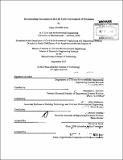| dc.contributor.advisor | Randolph E. Kirchain. | en_US |
| dc.contributor.author | Swei, Omar Abdullah | en_US |
| dc.contributor.other | Massachusetts Institute of Technology. Engineering Systems Division. | en_US |
| dc.date.accessioned | 2013-04-12T19:37:40Z | |
| dc.date.available | 2013-04-12T19:37:40Z | |
| dc.date.copyright | 2012 | en_US |
| dc.date.issued | 2012 | en_US |
| dc.identifier.uri | http://hdl.handle.net/1721.1/78541 | |
| dc.description | Thesis (S.M.)--Massachusetts Institute of Technology, Dept. of Civil and Environmental Engineering; and, (S.M.)--Massachusetts Institute of Technology, Engineering Systems Division, 2012. | en_US |
| dc.description | Cataloged from PDF version of thesis. | en_US |
| dc.description | Includes bibliographical references (p. 81-87). | en_US |
| dc.description.abstract | Life Cycle Cost Analysis (LCCA) is an important tool to evaluate the economic performance of alternative investments for a given project. It considers the total cost to construct, maintain, and operate a pavement over its expected life-time. Inevitably, input parameters in an LCCA are subject to a high level of uncertainty, both in the short-term and long-term. Under its current implementation in the field, however, LCCA inputs are treated as static, deterministic values. Conducting such an analysis, although computationally simpler, hides the underlying uncertainty of the inputs by only considering a few possible permutations. This suggests that although computationally simpler, the answer from the analysis may not necessarily be the correct one. One methodology to account for uncertainty is to treat input parameters as probabilistic values, allowing the analysis to consider a range of possible outcomes. There are two major reasons as to why probabilistic LCCAs, although recommended, have not been streamlined into practice. First, the LCCA of construction projects is a large-scale problem with many input parameters with a high-level of uncertainty. Second, there is a significant gap in research that statistically quantifies uncertainty for input values. This research addresses the latter point by statistically quantifying four types of uncertainty: the unit cost of construction, quantity of material inputs, occurrence of maintenance activities, and a particular emphasis is placed upon characterizing the evolution of material prices over time. Having statistically characterized uncertainty in the LCCA analysis, the application of the probabilistically derived inputs is illustrated in three scenarios. Pavement alternative designs are derived for a set of traffic conditions in a given location. The results of the analysis indicate the integration of probabilistic input parameters in the LCCA process allows for more robust conclusions when evaluating alternative pavement designs. Additionally, the case study shows treating input parameters probabilistically could potentially alter the pavement selection, and one parameter that greatly influences this is material-specific price projections. | en_US |
| dc.description.statementofresponsibility | by Omar Abdullah Swei. | en_US |
| dc.format.extent | 91 p. | en_US |
| dc.language.iso | eng | en_US |
| dc.publisher | Massachusetts Institute of Technology | en_US |
| dc.rights | M.I.T. theses are protected by
copyright. They may be viewed from this source for any purpose, but
reproduction or distribution in any format is prohibited without written
permission. See provided URL for inquiries about permission. | en_US |
| dc.rights.uri | http://dspace.mit.edu/handle/1721.1/7582 | en_US |
| dc.subject | Civil and Environmental Engineering. | en_US |
| dc.subject | Engineering Systems Division. | en_US |
| dc.title | Incorporating uncertainty in the Life Cycle Cost Analysis of pavements | en_US |
| dc.title.alternative | Incorporating uncertainty in the LCCA of pavements | en_US |
| dc.type | Thesis | en_US |
| dc.description.degree | S.M. | en_US |
| dc.contributor.department | Massachusetts Institute of Technology. Department of Civil and Environmental Engineering | |
| dc.contributor.department | Massachusetts Institute of Technology. Engineering Systems Division | |
| dc.identifier.oclc | 836786420 | en_US |
